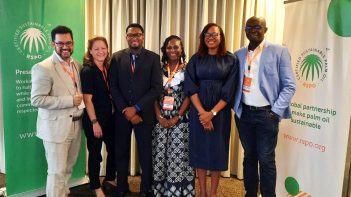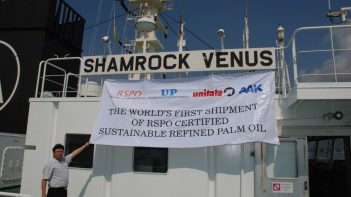Kuala Lumpur, Malaysia, 21 June 2012 – The RSPO (The Roundtable on Sustainable Palm Oil), an international multi stakeholder organization, shared today key updates on its strategies and priorities towards achieving its vision to transform markets to make sustainable palm oil the norm.
On the first strategic pillar which is to accelerate demand of RSPO Certified Sustainable Palm Oil (CSPO), Secretary General Darrel Webber commented that: “Our membership has grown by over 35% this year to close to 900 members from over 50 countries to date. But more significant than the progression in numbers is that membership has grown in the categories of Processors & Traders and Consumer Goods Manufacturers from Europe, which demonstrates growing interest towards certified sustainable palm oil. Since its launch just about a year ago, the RSPO Trademark is now currently adopted for toiletries and food products by many companies in the Europe and USA. We expect to see a few more mainstream popular brands adopt the trademark this year as a commitment to consumers that palm oil is responsibly sourced.”
Webber also commented that strategic discussions and collaborations have kicked off in two single largest consumer markets for palm oil – India and China, and that the RSPO aims to continue the momentum of engagement so that these key markets understand that they play a phenomenal role in protecting the environment, communities and businesses through market transformation to sustainable palm oil. He also said that there are many national initiatives such as the Dutch Task Force and the Belgian Alliance and a few more expected from Germany and the United Kingdom that are formally pledging their commitment towards RSPPO certified sustainable palm oil.
The second strategic pillar focuses on continuing production momentum through certification in Malaysia and Indonesia; as well as Papua New Guinea, West Africa and Latin America. To date, there are 30 grower companies with 146 mills RSPO certified covering a land area of 1,302,206 hectares with 6,432,103 mt of CSPO – approximately 12% of total global crude palm oil.
“We are implementing some significant initiatives with independent smallholders in key grower markers to assist them capital and capacity wise so they are able to embrace sustainable practices in order to protect their future livelihoods as sustainable palm oil becomes increasingly mainstream. Smallholders need to be made aware of the advantages of being certified which includes access to international demand markets for sustainable palm oil; longer term efficiencies in terms of yield and productivity as well as effective cost management” Webber further commented.
The third strategic pillar is to continue to enhance the integrity and standards of RSPO for certification. Five years since RSPO certification begun, its fundamental Principles and Criteria (P&C) are being currently reviewed. “There is now significant ground experience of what works and what may not be pragmatic. These experiences need to be drawn on to make the P&C more effective and robust.”
“Malaysia in its quest towards certified sustainable palm oil has achieved significant milestones – the second largest RSPO membership by country after United Kingdom; contributes 45% to the total volume of global CSPO; makes up 36% of certified grower companies around the world; close to 50% of total mills certified globally are from Malaysia. We are confident that Malaysia will continue its success and leadership towards sustainable palm oil as the business model of the future.” he concluded.
Malaysia is represented on the RSPO Executive Board by the Malaysian Palm Oil Association (MPOA) and FELDA for smallholders.
—END—
About RSPO
In response to the urgent and pressing global call for sustainably produced palm oil, the Roundtable on Sustainable Palm Oil (RSPO) was formed in 2004 with the objective of promoting the growth and use of sustainable oil palm products through credible global standards and engagement of stakeholders. The seat of the association is in Zurich, Switzerland, while the secretariat is currently based in Kuala Lumpur with a satellite office in Jakarta.
RSPO is a not-for-profit association that unites stakeholders from seven sectors of the palm oil industry – oil palm producers, palm oil processors or traders, consumer goods manufacturers, retailers, banks and investors, environmental or nature conservation NGOs and social or developmental NGOs – to develop and implement global standards for sustainable palm oil.
Such multi-stakeholder representation is mirrored in the governance structure of RSPO such that seats in the Executive Board and project level Working Groups are fairly allocated to each sector. In this way, RSPO lives out the philosophy of the "roundtable" by giving equal rights to each stakeholder group to bring group-specific agendas to the roundtable, facilitating traditionally adversarial stakeholders and business competitors to work together towards a common objective and making decisions by consensus.
—END—
For further information, kindly contact:
Contact for RSPO Secretariat:
Anne Gabriel, Communications Director | T:+603-22012053 | [email protected]
Laila Wilfred, Communications Coordinator | T:+603-22012053 | [email protected]
Keep reading
Call for Proposal: Study on Wild Palms in West and Central Africa

RSPO hosts first Africa downstream sustainable palm oil supply chain forum in Cape Town

Nearly two decades on, Europe continues to drive global demand for RSPO Certified Palm Oil

Communicating Sustainable Palm Oil - examples of success across Europe
[EOT] Terms of Reference: Independent Smallholders Outreach Programme in Indonesia

RT2023 Delegates Propose Solutions to Reinforce RSPO’s Assurance System – End-Year Highlights of Assurance Standing Committee
RSPO UK Members' Day Examines Shifting Dynamics of Doing Business within Europe

Celebrating 20 Years of RSPO’s Sustainability Journey




